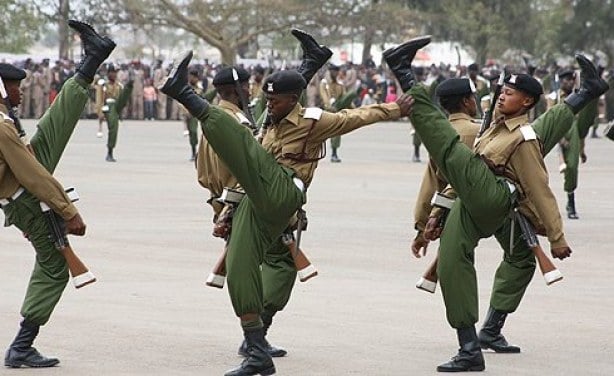The Massachusetts Police Academies offer additional training to those who are interested in becoming police officers. In addition, the Academies provide in-service law enforcement officers from across the Commonwealth substantial training opportunities, as well as the intensive Student program to enthusiastic youth candidates.
This article highlights information about Massachusetts Police Academies’ eligibility, requirements, and cost. Also, it outlines different Massachusetts police academies.
Table of contents
- What are Massachusetts Police Academies?
- Why Attend The Massachusetts Police Academies?
- How Many Police Academies Are In Massachusetts?
- What Are The Requirements For Massachusetts Police Academies?
- How Long Are Massachusetts Police Academies?
- Who Can Attend Mass Police Academies?
- What Should I Expect In Massachusetts Police Academies?
- How Much Do Massachusetts Police Academies Officers Make?
- How Do I Join The Massachusetts Police Academies?
- How Much Does It Cost To Attend Massachusetts Police Academies?
- FAQs On Massachusetts Police Academies
- Reference
- We Also Recommend
What are Massachusetts Police Academies?
Massachusetts Police Academies are training schools where you can be educated, prepared, and trained for recruitments in many areas as an officer.
In the Police force, it’s critical that the training be varied in order to adequately prepare officers for their day-to-day duties as well as the unexpected.
And most Massachusetts police academies offer programs that combine classroom instruction with rigorous physical training. They also cause the adoption of a rigorous lifestyle, such as adhering to strict appearance, sleeping, and eating habits.
To say the least, physical training in the academy is rigorous. Regular fitness tests are conducted to assess where each potential officer stands and how far they have progressed since the beginning.
Basically, academy training comprises body strengthening and jogging programs to guarantee that each officer can be ready to move rapidly with little warning. There is however handgun training and range time to properly educate and train police if they need to use their firearm. There may be extra weapons training, including a taser and pepper spray training.
Safety, psychology, local and state regulations, protocols, and even some light medical information are all covered in the classroom setting of police academy training. All the academic training helps officers have a better understanding of how to keep themselves and their communities safe.
READ ALSO: What is Six Sigma Training? How to get Sigma Training
Why Attend The Massachusetts Police Academies?
The police academy is an important stage in preparing officers to deal with the physical, mental, and emotional components of their jobs.
Police officers are tasked with more than just arresting criminals; they are also responsible for maintaining the law, which necessitates their ability to comprehend, interpret, and implement state and local laws in their jurisdiction.
The police academy is a vital phase in the process of becoming a police officer for these and other reasons.
RELATED POST: Utah Police Academies | Eligibility, Requirements, Cost
How Many Police Academies Are In Massachusetts?
There are over 100 police academies in the United State of America. Massachusetts houses about 26 police academies. Out of the 26, some of the best MPTC-authorized Full-time Police Academies include:
- Boston PD Police Academy.
- Cambridge Police Academy.
- Cape Cod Municipal Police Academy.
- Fitchburg State University Police Program.
- Lowell Police Academy, Lowell, MA.
- Northern Essex Community College (NECC) Police Academy.
- State Police Municipal Academy (SPMA) (Dormitories available)
- MBTA Police Academy
- Merrimack College
- Worcester Police Academy
- Quinsigamond Community College
SEE ALSO: 10 Nursing Schools In Massachusetts
#1 Quinsigamond Community College
Accreditation: New England Commission of Higher Education
Quinsigamond Community College is one of the Massachusetts police academies. It is a community college in Worcester, Massachusetts. The college is a commuter school with nearly 13,000 students enrolled in Associate degree and certification programs.
Many students participate in transfer programs with the goal of transferring to a four-year college or university, usually the University of Massachusetts Amherst or Worcester State University, via guaranteed-acceptance programs.
#2 Cambridge Police Academy
The Massachusetts Police Training Council (MPTC) certified Cambridge — Northeastern Police Academy is a training academy for incoming student officers. The four pillars of procedural justice are reflected in every aspect of the Academy experience: fairness, voice, transparency, and impartiality.
In this police academy, recruits learn that police is a “people business,” and that their ability to listen to and communicate with the individuals they encounter will be critical to their success as officers.
The emphasis on experiential learning, which includes officers participating in scenario-based activities and community engagement, is a crucial component of the training.
YOU MAY WANT TO SEE: 15 Best Technical Colleges in Massachusetts | Ranking
#3 Cape Cod Municipal Police Academy
Cape Cod Municipal Police Academy is one of the police Academies in Massachusetts that offers basic recruit officer training that can position you for great success in your career.
Also, this academy provides the best and up-to-date training that can give you the knowledge and skills you will need to be successful and safe during your career.
Enrolling in a training program in this police academy will not only ensure your competency at enforcing the law but will also make you effective at solving problems.
#4 Fitchburg State University Police Program.
Because around a quarter of the MPTC recruit curriculum is interwoven in the undergraduate courses, the Fitchburg State Academy is about 3-4 weeks shorter than a regular academy. Instructors who have been certified by the MPTC teach these classes.
In this Massachusetts police academy, you can finish the last 24 credits of your graduate degree at your own pace after finishing the police academy (which is worth 12 credits toward your Master’s degree).
In addition, all master’s courses are available online. The only MPTC certification accepted by the New Hampshire State Police, the New Hampshire Fish and Game Department, and many other cities and towns in the state is the Fitchburg State Academy.
They accept our academy as a substitute for the Massachusetts academy graduation requirement.
#5 Lowell Police Academy, Lowell, MA
The Lowell Student Police Academy is a summer leadership program offered by the School Resource Officers of the Lowell Police Department. During the summer vacation, the program runs for three weeks. Incoming 5th through 8th kids from Lowell and the nearby areas are welcome to apply.
In a Mass police academy setting, the Student Police Academy will train student cops in several valuable and important skills. CPR and first aid, bullying prevention, gang knowledge and prevention, avoiding peer pressure, Internet safety, and the perils of drugs and alcohol are among the subjects covered during the three-week program.
#6 Northern Essex Community College (NECC)
Northern Essex Community College (NECC) is an Essex County, Massachusetts public community college. The college serves residents of the Merrimack Valley and Southern New Hampshire. Haverhill and Lawrence are both home to their campuses.
The college is a component of the Massachusetts System of Higher Education. Over 6,600 students are enrolled in 70 credit associate degree and certificate programs on campus and 3,400 non-credit workforce development and community education sessions at businesses and community venues around the Merrimack Valley. The New England Commission of Higher Education has granted Northern Essex Community College accreditation.
#7 State Police Municipal Academy (SPMA)
The Massachusetts State Police Academy is one of the functional mass police academies in rural New Braintree on 780 acres. This is where all State Police recruit training takes place.
Recruits attend a twenty-five-week live-in academy with a modified stress level that includes over ninety different courses. The Academy also offers in-service training, training seminars, and the Student Trooper program, besides recruit training.
#8 Citizens Police Academy
The Citizens Police Academy is a Massachusetts police academy that is free and open to any member of the UMass community or their immediate family. It is intended to be a fun and educational environment.
Participation and discussion are encouraged. The Citizens Police Academy is an 11-week course that is taught twice a semester, once in the spring and once in the fall. Classes usually meet for three hours one evening per week. The following are some themes covered:
- Laws of criminal and constitutional nature
- Laws governing motor vehicles and traffic stops
- Problems with alcohol and drugs
- Use of force by cops
- Safety with firearms
- Forensic science is the study of crime.
What Are The Requirements For Massachusetts Police Academies?
For consideration to attend an MPTC or MPTC authorized Full-time police academy, all applicants must meet the prerequisites listed below.
- Minimum age requirement is 21 years old (See 550 CMR 3.06: Recruit Training Enrollment of the MPTC CMRs Regulating Training)
- A municipal, environmental, or University of Massachusetts police department employs or sponsors you.
- Physical Ability Test after a Comprehensive Medical Exam (PAT)
- For the length of the police academy, you will have full medical coverage.
How Long Are Massachusetts Police Academies?
Every police academy is a little different, but most of the policies are similar. Recruits in Massachusetts Police Academies must complete 800 hours of instruction before they can be sworn in. And while 800 hours may only equal roughly 5 months if working a 40-hour week, many academies demand 6-8 months of overall instruction.
Who Can Attend Mass Police Academies?
It’s difficult to believe that there are restrictions on who can safeguard our neighborhoods, but there are a few key ones that were put in place with good purposes.
While each police department’s criteria differ, most demand that the applicant is between the ages of 18 and 21. It may come as a surprise to learn that a high school certificate or GED is often all that is required for a person to be hired as a police recruit.
There are hiring tests, such as background checks, fitness tests, and psychological exams that must be passed in order to be employed and offered a position.
What Should I Expect In Massachusetts Police Academies?
In any Massachusetts Police academy or a law enforcement training school to be properly trained as a police officer.
Each state has its own set of criteria for law enforcement training, so how it looks will vary depending on which state you’re in. The recruit receives both hands-on and classroom training at the police academy.
The following are some topics covered in class:
- States have their own laws.
- Procedures for patrolling
- Firearms instruction
- Self-protection
- First-aid treatment
- Bargaining with a hostage
- Psychology in the criminal justice system
Furthermore, some of the hands-on training includes:
- Physical activity
- Investigate fictitious criminal scenes
- directing traffic in a safe and efficient manner
- Vehicles to be driven
- Firearms should be used correctly.
- Techniques of investigation
- Techniques of interrogation
- Ethics
How much training do police get in Massachusetts Police Academies?
How Much Do Massachusetts Police Academies Officers Make?
During their training at a Mass police academy, officers are paid their entire starting wage. If you successfully complete the police academy, you will most likely receive a raise in pay.
This wage rise can be as much as $2,000 or $3,000 more than what you received while training, depending on the police agency where you work.
How Do I Join The Massachusetts Police Academies?
In Massachusetts Police Academies, recruit training is conducted according to a paramilitary-style curriculum that is both physically and intellectually demanding.
While it is intended to be difficult, it is not intended to be impossible. Motivated individuals will benefit from training to gain the endurance, skills, and knowledge they’ll need on the job and in the field. Those who are interested should learn everything they can about the physical requirements and intellectual program.
How Much Does It Cost To Attend Massachusetts Police Academies?
The expense of attending a police academy is quite low when compared to the benefits of a rewarding profession. The average cost of a police academy is around $5,000, and many departments will pay you for a portion of that expense.
Tuition and any other costs linked with the police academy, such as the uniform, should be included in the fees. In-state tuition at the police academy is far less expensive than out-of-state tuition, as with most educational fees.
The police academy is held at several community colleges in collaboration with local police forces. The time spent in a police academy varies, but the national average is six months.
FAQs On Massachusetts Police Academies
The average cost of a Massachusetts police academy is around $5,000.
There are 26 Massachusetts Police Academies.
The best Mass Police Academies are; Boston PD Police Academy, Cambridge Police Academy, Cape Cod Municipal Police Academy, Fitchburg State University Police Program,
Lowell Police Academy, Lowell, MA., Northern Essex Community College (NECC) Police Academy, State Police Municipal Academy (SPMA) (Dormitories available), MBTA Police Academy, Merrimack College, Worcester Police Academy, Quinsigamond Community College
Reference
- mass.gov – Entry-level Police Academy Training
- boston.gov – HOW TO BECOME A POLICE OFFICER
- necc.smartcatalogiq.com – Methuen Police Academy
- mass.gov – Fulltime Police Academy Requirements
We Also Recommend
DISCLOSURE: This post may contain affiliate links, meaning when you click the links and make a purchase, we receive a commission.






1 comment
Comments are closed.